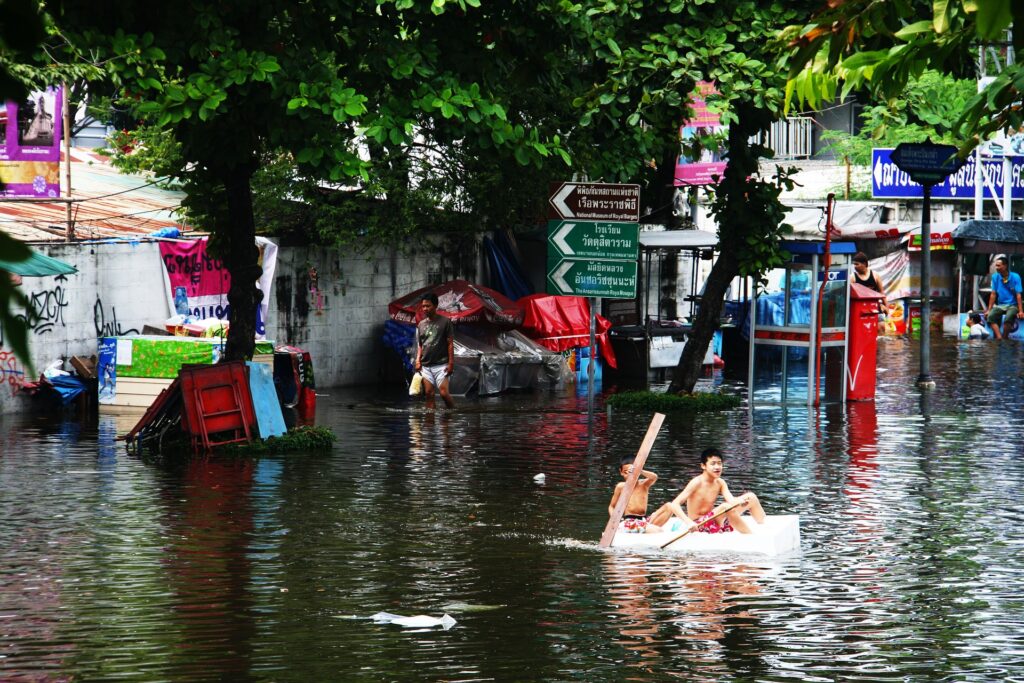A disaster related to a weather, climate or water hazard occurred every day on average over the past 50 years – killing 115 people and causing US$202m in losses daily, according to a new report from the World Meteorological Organization (WMO).
The number of disasters has increased by a factor of five over the 50-year period, driven by climate change, more extreme weather and improved reporting. However, thanks to improved early warnings and disaster management, the number of deaths decreased almost threefold.
According to the WMO Atlas of Mortality and Economic Losses from Weather, Climate and Water Extremes (1970 – 2019), there were more than 11,000 reported disasters attributed to these hazards globally, with just over two million deaths and US$3.64tn in losses.
The report is the most comprehensive review of mortality and economic losses from weather, water and climate extremes to date. It assesses the entire 50-year period as well as by individual decade.
From 1970 to 2019, weather, climate and water hazards accounted for 50% of all disasters, 45% of all reported deaths and 74% of all reported economic losses. More than 91% of these deaths occurred in developing countries.
Of the top 10 disasters, the hazards that led to the largest human losses during the period have been droughts (650,000 deaths), storms (577,232 deaths), floods (58,700 deaths) and extreme temperature (55,736 deaths).
Deaths decreased almost threefold from 1970 to 2019. Death tolls fell from over 50,000 deaths in the 1970s to less than 20,000 in the 2010s. The 1970s and 1980s reported an average of 170 related deaths per day. In the 1990s, that average fell by one third to 90 related deaths per day, then continued to fall in the 2010s to 40 related deaths per day.
Regarding economic losses, the top 10 events include storms (US$521bn) and floods (US$115bn).
During the 50-year period, US$202m in damage occurred on average every day. Economic losses have increased sevenfold from the 1970s to the 2010s. The reported losses from 2010–2019 (US$383m per day on average over the decade) were seven times the amount reported from 1970–1979 (US$49m). Storms were the most prevalent cause of damage, resulting in the largest economic losses around the globe. It is the sole hazard for which the attributed portion is continually increasing.
Three of the costliest 10 disasters occurred in 2017: Hurricanes Harvey (US$96.9bn), Maria (US$69.4bn) and Irma (US$58.2bn). These three hurricanes alone accounted for 35% of the total economic losses of the top 10 disasters around the world from 1970 to 2019.
Petteri Taalas, WMO secretary-general, said, “The number of weather, climate and water extremes are increasing and will become more frequent and severe in many parts of the world as a result of climate change. That means more heatwaves, drought and forest fires such as those we have observed recently in Europe and North America. We have more water vapor in the atmosphere, which is exacerbating extreme rainfall and deadly flooding. The warming of the oceans has affected the frequency and area of existence of the most intense tropical storms,” he comments.
“Economic losses are mounting as exposure increases. But, behind the stark statistics, lies a message of hope. Improved multi-hazard early warning systems have led to a significant reduction in mortality. Quite simply, we are better than ever before at saving lives.”
According to the WMO, much more remains to be done as only half of its 193 members possess multi-hazard early warning systems and there are severe gaps in weather and hydrological observing networks in Africa, some parts of Latin America and in Pacific and Caribbean Island states.
Mami Mizutori, special representative of the secretary-general for disaster risk reduction and head of the UN Office for Disaster Risk Reduction (UNDRR), which has now moved into WMO headquarters in Geneva, said, “More lives are being saved thanks to early warning systems but it is also true that the number of people exposed to disaster risk is increasing due to population growth in hazard-exposed areas and the growing intensity and frequency of weather events. More international cooperation is needed to tackle the chronic problem of huge numbers of people being displaced each year by floods, storms and drought. We need greater investment in comprehensive disaster risk management ensuring that climate change adaptation is integrated in national and local disaster risk reduction strategies.
“The overlap of the Covid-19 pandemic with many other natural and manmade hazards, especially extreme weather events during the last 18 months, demonstrates the need for greater investment in disaster risk reduction and a multi-hazard approach to disaster risk management and early warning systems to reduce risks and strengthen preparedness for multiple disaster scenarios,” she said.
To view the WMO Atlas of Mortality and Economic Losses from Weather, Climate and Water Extremes (1970 – 2019), click here.



